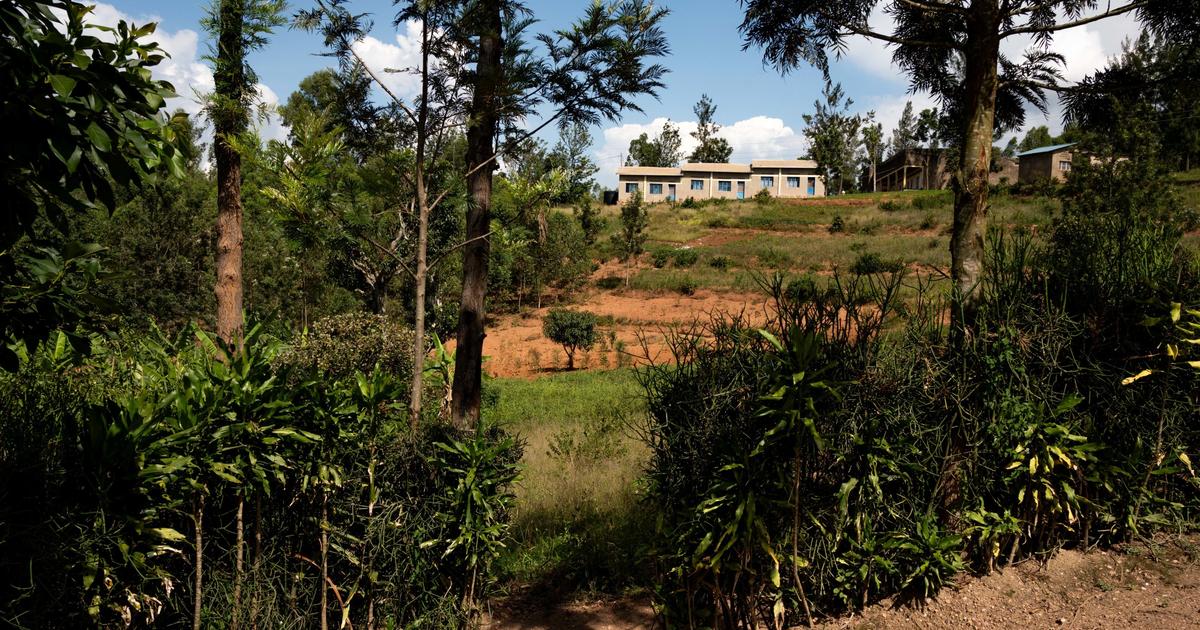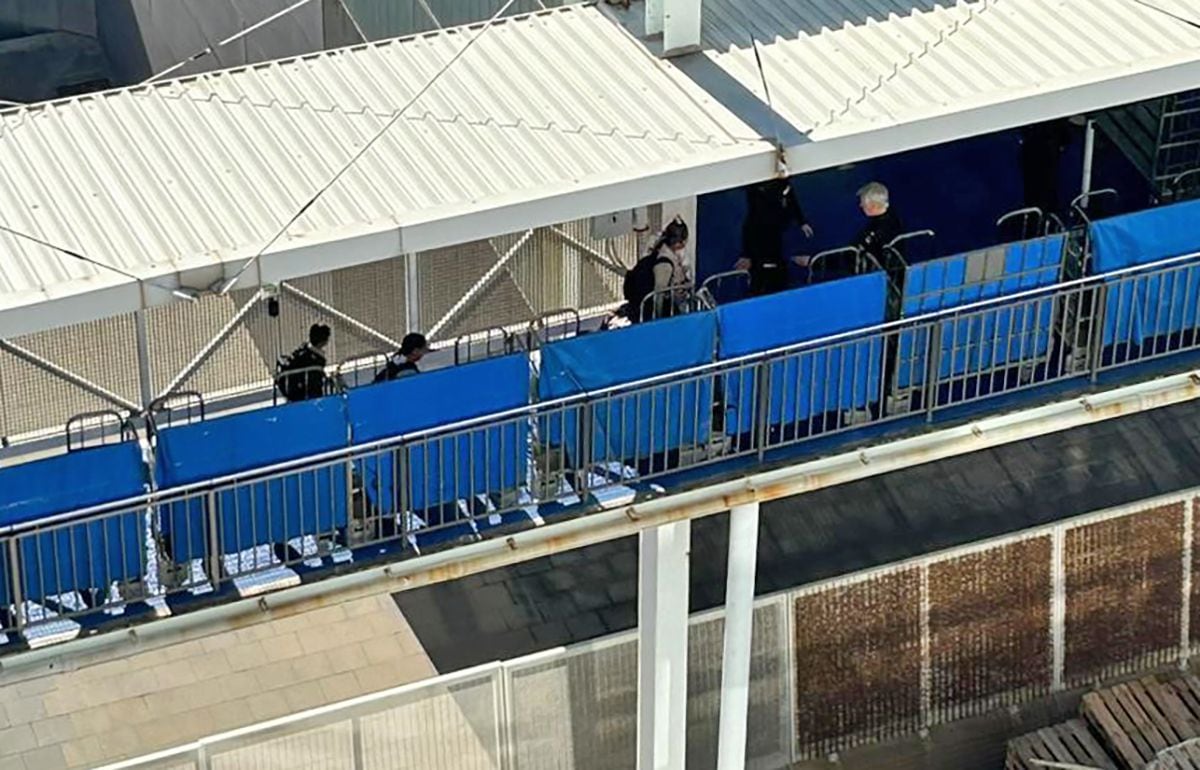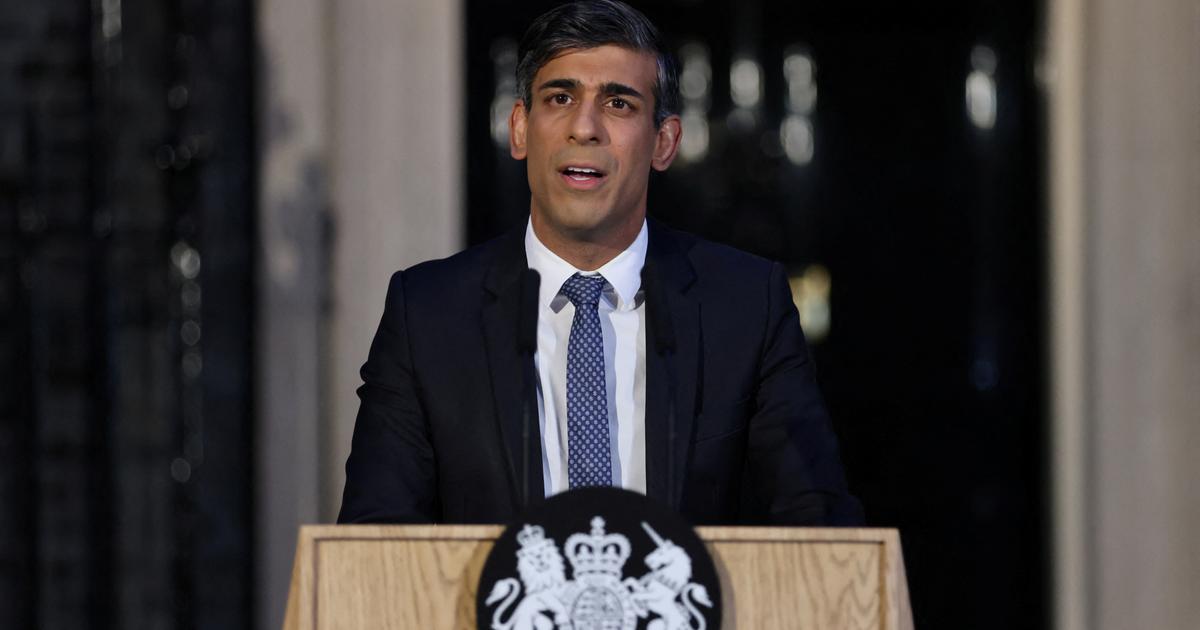Enlarge image
Stopped at the last minute: deportation flight to Rwanda
Photo: HANNAH MCKAY / REUTERS
Ismael Bakina is sitting in his hostel in Kigali as a Boeing 767 warms up the engines on the runway at Boscombe Air Force Base in Great Britain.
The plane will soon bring new guests to him overnight.
Sure, they don't come voluntarily, but the deported asylum seekers should still have a good time at the Hope Hostel, of which he is the manager.
Cosmetic products are on the bedside tables, decorative fabric ribbons are draped over the white bedspreads, and the long tables in the dining room have fresh red tablecloths.
Two large clocks hang behind the reception desk, with signs above them: "London Time" and "Paris Time".
The clock on the left, London Time, shows almost 8pm when the news arrives.
The flight was cancelled, Ismael Bakina's guests aren't coming after all.
A judgment in distant Strasbourg prevented their arrival.
The European Court of Human Rights has halted the deportation of seven UK asylum seekers to Rwanda.
Around midnight, Bakina leaves Hope Hostel and drives home.
It's not a good day for him.
On Monday, the day before, the world looks very different.
Ismail Bakina has put on his best suit and looks extremely content, almost excited.
With his back straight, he stands in front of the assembled international press, he gesticulates a lot, talks about twin rooms and smoking areas.
Next to Bakina, a representative of the Rwandan government makes sure that he doesn't say anything wrong.
"We're ready," says the manager and smiles.
The minder looks satisfied.
Bakina tells the journalists that an overnight stay with full board costs 72,000 Rwandan francs, the equivalent of 70 US dollars.
He can take in more than 100 asylum seekers, and his hostel is fully booked by the Rwandan government.
Then the TV teams are guided through the building, and DER SPIEGEL is there too.
Through the dining room, through the prepared double rooms, through the garden, even into the specially equipped interview room where the refugees are supposed to submit their asylum application against their will.
Because none of the asylum seekers is drawn to Rwanda voluntarily, on the contrary.
They were intended to be victims of a cynical deal struck between the British and Rwandan governments.
Migrants who cross the English Channel in inflatable boats should not even get a chance to seek asylum in Great Britain.
Instead, according to the plan, they should be deported to Rwanda immediately and apply for asylum there.
Out of sight, out of mind.
The chronology of the past few days was well thought out, even a British PR company was involved in the background.
On Tuesday afternoon, a few hours before the planned deportation flight, the Rwandan government invited people to the Foreign Ministry.
The start is a little delayed, the media representatives still have to do a rapid Covid test, the last journalist is being waited for.
Every article, every TV report counts, the refugee deal is not hidden here in Kigali.
On the contrary.
After the questions from the Rwandan journalists, government spokeswoman Yolande Makolo nods politely. Questions like "How can the asylum seekers become regular residents of Rwanda?" or "What leisure activities are offered to them?" The press in Rwanda is not free, who reports critically, risk serious consequences.
The questions from the British colleagues sound different: »The deal is met with criticism around the world.
Doesn't that bother you?' or 'The Church of England strongly criticizes the agreement.
As a Christian nation, what do you say to that?”
But that doesn't bother the government spokeswoman either, of course she expected a headwind.
"We have genuine motives," replies Yolande Makolo.
Rwanda is a nation that has always offered refugees a safe home.
At the press conference it becomes clear: the government is at peace with itself, the agreement with the United Kingdom is its great opportunity, a coup for a nation with a dubious human rights situation.
Let the journalists from England ask their critical questions.
At this point, the deal has already collapsed like a soufflé.
In the days before, more than 100 asylum seekers turned into almost 30, then 11, on Tuesday afternoon there were only seven left, according to media reports.
The British authorities had removed the others from the passenger list again because of legal concerns.
Nevertheless, combative signals came from London: even if there was only one passenger on board, one would fly.
After all, two courts in England had previously rejected injunctions for asylum seekers.
»Some have a wrong image of Rwanda«
"We will take good care of the migrants," said the government spokeswoman on Tuesday afternoon.
"Some have the wrong image of Rwanda," she adds.
Last year, the British government criticized Rwanda for human rights violations. After all, critics in the small East African country are locked up, allegedly tortured, and some disappear from the scene entirely.
Now suddenly Rwanda is "friend and partner," says British Home Secretary Priti Patel, Rwanda is "a safe country that guarantees the rule of law."
She has to say so, because otherwise her government would not be allowed to send asylum seekers there.
Yolande Makolo is visibly satisfied that so many journalists from all over the world came to Kigali this Tuesday.
Most of the whites sit in the front rows and are extensively filmed by the Rwandan media.
The message is clear: our country is taken seriously by the rest of the world.
Then, around 8 p.m. London time, the beautiful illusion bursts.
The European Court of Human Rights has issued an injunction, an Iraqi on board may not be deported.
Almost an hour later it is clear: the entire plane remains on the ground.
The verdict is an embarrassment for the Rwandan government, which just a few hours earlier seemed so confident of victory.
In the end, a legal analysis by the United Nations refugee agency UNHCR probably tipped the scales.
The asylum system in Rwanda is deficient, they say, and international standards are sometimes not complied with.
The UN lawyers report on events from 2018, when hundreds of refugees protested against reduced food rations.
In the end, 12 of them were dead, shot by Rwandan security forces.
66 others were arrested, some are still in jail today.
Nadia Ingabire can still remember the days in February 2018 well.
The World Food Program had just cut food rations by 25 percent, and the refugees, especially from the Democratic Republic of the Congo, were suffering from hunger.
They marched in front of the UNHCR office, including several members of Ingabire's family.
Tear gas canisters flew first, then live ammunition.
A relative of hers is still in prison, says Ingabire, and another has lost his leg.
"I've been very afraid of the Rwandan police ever since," she says.
Ingabire is sitting on the steps in front of the lecture hall at her university in Kigali, she adjusts the glasses with the transparent rims and takes a quick look around.
The student speaks quietly when she talks about what happened four years ago.
Because she's been lucky since then, she doesn't want to jeopardize that.
The 20-year-old received a scholarship as one of five refugees from her camp.
It was her ticket out of misery.
"I can't put into words how happy I was when I held the decision in my hands," she says.
Her family is still living in the camp, for seven years now.
At that time they fled from the fighting in the east of the Congo, today they live in a small hut with ten of them.
The camp lacks everything, says the student.
Many women would prostitute themselves to get anything to eat at all.
A few days ago, Ingabire was reminiscing about 2018.
A note was handed to her family, and the 20-year-old had to read it several times to understand the implications.
The cash for food rations is to be cut by half, it is written.
»Then we can only afford one meal a day«, says the student.
A small UNHCR pie chart shows the seriousness of the situation.
It illustrates what percentage of the funds needed for the refugee camps in Rwanda are secured.
Not even a fifth of the circle is filled, in the middle is written in large black letters "18 percent".
If that doesn't change soon, there will be even less food for the refugees and even more desperation in the camps.
There is another statistic from the UNHCR, in which the individual donors are listed.
In previous years, the United Kingdom appeared at the top of this list, in 2020 Great Britain transferred 135 million euros to the refugee agency.
But Boris Johnson now has other priorities, last year not even half of this amount was paid.
In the first few months of this year things are not looking any better.
Britain has pledged £120million to Rwanda - and that's just the down payment
A few kilometers from Nadia Ingabire's university, in front of the Hope Hostel, a French television reporter makes a statement on Wednesday morning.
He says that the asylum seekers aren't coming after all, that the flight was stopped at the last minute.
Two Rwandan security guards stand by, they don't look very happy.
Ismael Bakina, the hotel manager, no longer responds to WhatsApp messages.
The government spokeswoman meanwhile sent a defiant text message: "Rwanda remains committed to implementing the agreement with Great Britain."
Boris Johnson's government has pledged £120million to Rwanda and that's just the down payment for the deal.
There is also a flat rate per asylum seeker.
According to media reports, the canceled deportation flight on Tuesday cost £500,000.
Great Britain is paying a lot to ship the refugees to Africa.
Nadia Ingabire says: "That shows: They have enough money.
They simply don’t care about the fate of us refugees.«
This contribution is part of the Global Society project
Expand areaWhat is the Global Society project?
Under the title »Global Society«, reporters from
Asia, Africa, Latin America and Europe
report on injustices in a globalized world, socio-political challenges and sustainable development.
The reports, analyses, photo series, videos and podcasts appear in a separate section in the foreign section of SPIEGEL.
The project is long-term and is supported by the Bill & Melinda Gates Foundation (BMGF).
A detailed FAQ with questions and answers about the project can be found here.
AreaWhat does the funding look like in concrete terms?open
The Bill & Melinda Gates Foundation (BMGF) has been supporting the project since 2019 for an initial three years with a total of around 2.3 million euros - around 760,000 euros per year.
In 2021, the project was extended by almost three and a half years until spring 2025 under the same conditions.
AreaIs the journalistic content independent of the foundation?open
Yes.
The editorial content is created without the influence of the Gates Foundation.
AreaDo other media also have similar projects?open
Yes.
With the support of the Gates Foundation, major European media outlets such as The Guardian and El País have set up similar sections on their news sites with Global Development and Planeta Futuro respectively.
Did SPIEGEL already have similar projects? open
In recent years, SPIEGEL has already implemented two projects with the European Journalism Center (EJC) and the support of the Bill & Melinda Gates Foundation: the "OverMorgen Expedition" on global sustainability goals and the journalistic refugee project "The New Arrivals ", within the framework of which several award-winning multimedia reports on the topics of migration and flight have been created.
Expand areaWhere can I find all publications on the Global Society?
The pieces can be found at SPIEGEL on the Global Society topic page.















